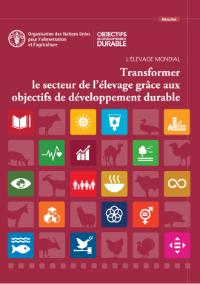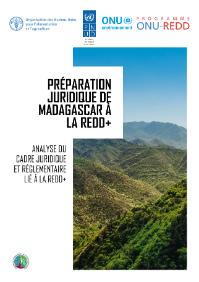Focal point
Location
The Food and Agriculture Organization of the United Nations leads international efforts to defeat hunger. Serving both developed and developing countries, FAO acts as a neutral forum where all nations meet as equals to negotiate agreements and debate policy. FAO is also a source of knowledge and information. We help developing countries and countries in transition modernize and improve agriculture, forestry and fisheries practices and ensure good nutrition for all. Since our founding in 1945, we have focused special attention on developing rural areas, home to 70 percent of the world's poor and hungry people.
Members:
Resources
Displaying 191 - 195 of 5074L’élevage mondial : Transformer le secteur de l’élevage grâce aux objectifs de développement durable – Résumé
Ce document présente un aperçu des principaux messages de la publication "Transformer le secteur de l’élevage grâce aux objectifs de développement durable"
Evaluation of FAO’s Contribution to The Kingdom of Cambodia - Summary report
Evaluation of FAO’s Contribution to Cambodia Although Cambodia is rapidly transitioning to a more industrialised economy, the country is still among the poorest in Southeast Asia, and the risk of sliding back into poverty remains high, especially for rural households. The goal of FAO’s programme in Cambodia has been to contribute to the eradication of poverty, food insecurity and malnutrition while promoting sustainable natural resource management. The 2018 country programme evaluation highlighted FAO’s comparative advantage – as a trusted purveyor of data and technical advice.
Development of a Regional Aquatic Biosecurity Strategy for the Southern African Development Community (SADC)
This document details the activities that were undertaken by the Food and Agriculture Organization of the United Nations (FAO) and cooperating agencies (the Department of Agriculture, Forestry and Fisheries of South Africa (DAFF), the Africa Union Inter-African Bureau for Animal Resources (AU-IBAR) and the Southern Africa Development Community (SADC)) leading to the production of a Regional Aquatic Biosecurity Strategy for the Southern African Development Community (SADC) and its subsequent adoption by SADC and incorporation into SADC programmes.
Évaluation des besoins liés à la mise en place d'un système national de surveillance des forêts à Madagascar en vue de la préparation du pays à la REDD+
Le mécanisme de Réduction des émissions causées par le déboisement et la dégradation des forêts dans les pays en développement; et rôle de la conservation, de la gestion durable des forêts et du renforcement des stocks de carbone forestiers dans les pays en développement (REDD+) est un mécanisme international; il vise à inciter les pays à réduire les émissions provenant de leurs forêts en attribuant une valeur financière au carbone stocké dans les forêts.
Préparation juridique de Madagascar à la REDD+
L’initiative de Réduction des émissions causées par le déboisement et la dégradation des forêts dans les pays en développement; et rôle de la conservation, de la gestion durable des forêts et du renforcement des stocks de carbone forestiers dans les pays en développement (REDD+) vise à inciter les pays boisés en développement à protéger leurs ressources forestières; elle contribuera ainsi à la lutte mondiale contre les changements climatiques et au développement économique et social durable.











